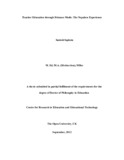Please use this identifier to cite or link to this item:
http://archive.nnl.gov.np:8080/handle/123456789/50| Title: | Teacher education through distance mode: the Nepalese experience |
| Authors: | Sapkota, Santosh |
| Keywords: | Teacher education -- Nepal Open education -- Nepal Distance education -- Nepal |
| Issue Date: | 19-Dec-2017 |
| Abstract: | Distance education has been recognised around the world as a viable and cost-effective method for the initial training of teachers, and for their continuing professional development. In Nepal, one teacher training college has been offering a teacher education course through distance mode. In this regard, the main objective of this study was to seek a deeper understanding of the programme and to determine its overall quality. To achieve this, the research utilised a case study methodology and explored the experiences and reactions of students, tutors/founder members on this B.Ed. programme. To systematically assess the programme’s effectiveness, the research developed a new analytical framework, based on current literature, appropriate for this context. The framework was further refined as data were analysed. The study revealed that the quality of Self-Learning-Materials provided were poor in terms of content presentation, coverage, student-content interaction, and in encouraging distance students in learning. While the poor quality of the materials was partly due to inadequate finances, it was also due to a lack of expertise and training in distance learning materials development. The distance approach introduced by the college was highly appreciated by students, but the study revealed that the context in which the college worked had impeded development. Initiatives were constrained by several issues, such as the college and its study centres operating with minimal physical infrastructure and logistics, poor learning resources and inadequate staffing. The college and university management and administration was inefficient in supporting its students and staff. Study findings indicate that the quality of the programme was undermined by several factors such as political instability, absence of government support, insufficient finances, poor infrastructure, management incompetence, a lack of adequately trained staff, and shortage of expertise in distance learning. The findings suggest that the quality and sustainability of the programme could be ensured through political commitment, government support, staff development and training, use of communication technology, collaborative partnerships and the establishment of quality assurance mechanisms. This study makes a unique contribution to the field of teacher education through distance mode by exploring its effectiveness in Nepal, and brings to light the complexities and challenges of distance education in a politically unstable, under-resourced and development context. |
| Description: | A thesis submitted in partial fulfillment of the requirements for the Degree of Doctor of Philosophy in Education Centre for Research in Education and Educational Technology, The Open University, UK, 2012 |
| URI: | http://103.69.125.248:8080/xmlui/handle/123456789/50 |
| Appears in Collections: | 300 Social sciences |
Files in This Item:
| File | Description | Size | Format | |
|---|---|---|---|---|
| Santosh Sapkota - PhD Thesis - Nepal Bhusan.pdf | 6.36 MB | Adobe PDF |  View/Open |
Items in DSpace are protected by copyright, with all rights reserved, unless otherwise indicated.